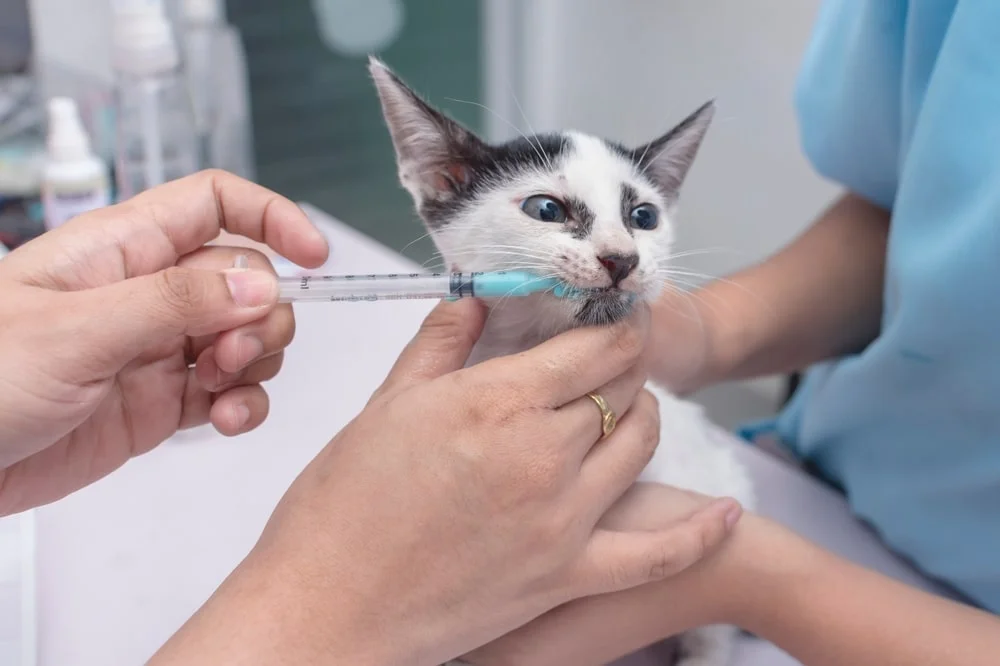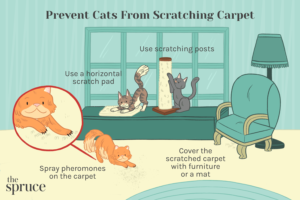As an Amazon Associate I earn from qualifying purchases.
Deworming a cat is essential for its health. It helps prevent various illnesses.
Cats can easily get worms from many sources. These tiny parasites can cause serious health issues if not treated. Proper deworming keeps your cat healthy and happy. In this guide, you’ll learn how to safely deworm your cat. We will cover the signs of worms, the types of dewormers available, and the steps to take for effective treatment.
Whether you are a new cat owner or have had cats for years, this information will help you keep your feline friend free from parasites. Ready to ensure your cat stays worm-free? Let’s dive in!
Signs Of Worms In Cats
Worms are common parasites in cats. They can cause serious health issues. Identifying the signs early can help in timely treatment. Here are some key signs to look out for in your feline friend.
Physical Symptoms
Physical symptoms are often the first indicators of worms in cats. Here are some common signs:
- Weight Loss: Despite a good appetite, your cat may lose weight.
- Bloated Belly: A swollen abdomen can indicate a worm infestation.
- Visible Worms: Worms or eggs may be visible in feces or around the anus.
- Diarrhea: Frequent and loose stools can be a symptom.
- Vomiting: Cats may vomit, and sometimes worms are visible in the vomit.
Behavioral Changes
Worms can also cause behavioral changes in cats. These changes include:
- Increased Hunger: Your cat may seem hungrier than usual.
- Lethargy: A decrease in energy levels and more sleep.
- Irritability: Cats may become more irritable or restless.
- Scratching: Frequent scratching or licking of the anal area.

Credit: www.metlifepetinsurance.com
Preparing For Deworming
Preparing for deworming your cat involves several important steps. Taking the right actions ensures the process goes smoothly and keeps your cat healthy. Here, we will cover the key steps to take before deworming your cat.
Consulting A Veterinarian
Before starting, consult a veterinarian. They will provide expert advice tailored to your cat’s needs. A vet will assess your cat’s health and recommend the best deworming treatment.
Vets can also identify the type of worms affecting your cat. This is crucial for selecting the right medication. Regular check-ups and professional guidance help keep your cat worm-free.
Choosing The Right Dewormer
Choosing the right dewormer is essential. Not all dewormers are the same. Different worms require different treatments. Here are some factors to consider:
- Type of Worm: Identify if your cat has roundworms, tapeworms, or another type.
- Age of Cat: Kittens need different treatment compared to adult cats.
- Health Condition: Some treatments may not be suitable for sick or pregnant cats.
Your vet can recommend the best dewormer based on these factors. Follow the dosage instructions carefully to ensure effectiveness and safety.
By following these steps, you can prepare effectively for deworming your cat. Proper preparation ensures your cat stays healthy and happy.
Administering Deworming Medication
Ensuring your cat stays free from worms is crucial for their health. Administering deworming medication can seem challenging. But with the right method, it becomes easier. Here’s how you can do it using oral and topical treatments.
Oral Medication
Oral medication is a common method for deworming cats. These medications come in various forms like tablets, capsules, and liquids. Here’s a step-by-step guide to help you:
- Hold your cat gently but firmly.
- Open their mouth carefully.
- Place the tablet or liquid at the back of their tongue.
- Close their mouth and stroke their throat to encourage swallowing.
You can also hide the medication in food. Use a small amount of their favorite treat. This trick works well for picky eaters. Always ensure your cat consumes the full dose.
Topical Treatments
Topical treatments are a great alternative for cats that resist oral medication. These treatments are applied directly to the skin. Follow these steps for effective application:
- Part the fur between your cat’s shoulder blades.
- Apply the medication directly to the skin.
- Ensure the area is dry until the medication is absorbed.
Topical treatments are convenient and easy to use. They work effectively without the stress of forcing oral medication. Always follow the dosage instructions on the package.
| Method | Form | Application |
|---|---|---|
| Oral | Tablets, Capsules, Liquids | Direct or with food |
| Topical | Liquid | Applied on skin |
Both methods are effective. Choose the one that suits your cat best. Regular deworming keeps your cat healthy and happy.

Credit: www.youtube.com
Aftercare Post-deworming
After deworming, it is important to care for your cat properly. This helps ensure a full recovery. Proper aftercare can prevent complications and promote your cat’s health.
Monitoring Your Cat
After deworming, keep a close eye on your cat. Look for any unusual behavior. Check their appetite and energy levels. Normal activities should resume within a day or two.
Ensure your cat has fresh water and a clean litter box. Watch for signs of worms in their stool. This can help confirm the treatment’s effectiveness.
Make note of any vomiting or diarrhea. These could be side effects. If symptoms persist, contact your vet.
Managing Side Effects
Some cats may experience side effects after deworming. Common side effects include:
- Vomiting
- Diarrhea
- Loss of appetite
- Lethargy
Provide your cat with a quiet, comfortable space. This can help them recover. Ensure they stay hydrated. Offer small, frequent meals. Avoid giving any new foods during this time.
If side effects last more than 24 hours, consult your vet. Severe reactions are rare but possible. Always follow your vet’s advice for post-deworming care.
| Action | Details |
|---|---|
| Monitor Symptoms | Watch for any unusual behavior or persistent side effects. |
| Provide Fresh Water | Ensure your cat stays hydrated after treatment. |
| Check Stool | Look for signs of worms to confirm the treatment worked. |
| Contact Vet | If side effects last more than 24 hours, seek professional advice. |
By following these steps, you can help your cat recover quickly. Proper aftercare ensures your cat stays healthy and happy.
Preventing Future Worm Infections
Deworming a cat involves giving them a vet-prescribed medication. This helps to kill and remove worms from their body. Regular deworming keeps your cat healthy and prevents future worm infections.
Preventing future worm infections in cats is crucial for their health. Effective measures will help keep your feline friend free from worms. Let’s explore some essential steps to prevent worm infections.Regular Vet Check-ups
Regular vet check-ups are vital for your cat’s health. The vet can spot early signs of infections. Early detection means quicker treatment. Schedule visits at least once or twice a year. Vaccinations and deworming medications are also discussed during these visits. The vet will recommend the best products for your cat. Following their advice helps keep your cat worm-free.Maintaining Clean Living Conditions
Maintaining clean living conditions is another key step. Keep your cat’s litter box clean. Scoop it daily and change the litter regularly. This reduces the chance of worm eggs spreading. Clean your cat’s bedding often. Wash it in hot water to kill any parasites. Regularly vacuum your home to remove any eggs from carpets and furniture. Prevent your cat from hunting or roaming outdoors. Outdoor cats are more exposed to worm infections. Supervise their time outside or create a safe, enclosed space for them. Regularly wash your hands after handling your cat. This simple step prevents any transfer of worm eggs to you or other pets. By following these steps, you can keep your cat healthy and free from future worm infections. “`
Credit: www.wikihow.com
Home Remedies And Natural Alternatives
Deworming a cat can be done naturally. Home remedies and natural alternatives often provide a gentle approach. These methods can be effective and safe for your furry friend.
Herbal Treatments
Herbs can help eliminate worms. Many herbs have natural anti-parasitic properties.
- Turmeric: Turmeric has anti-inflammatory and anti-parasitic effects. Add a small amount to your cat’s food.
- Garlic: Garlic is known for its anti-parasitic properties. Crush a small clove and mix it with your cat’s food.
- Pumpkin Seeds: Pumpkin seeds contain cucurbitacin, a compound that helps to expel worms. Crush the seeds and mix them with food.
Dietary Supplements
Supplements can support your cat’s health. They can also help fight off parasites.
| Supplement | Benefit |
|---|---|
| Probiotics: | Boosts gut health and immune system. |
| Digestive Enzymes: | Aids digestion and helps eliminate parasites. |
| Omega-3 Fatty Acids: | Supports overall health and immune function. |
Ensure that any supplement is safe for cats. Always consult with a vet before introducing new treatments.
When To Seek Professional Help
Knowing when to seek professional help during the deworming process is crucial. Sometimes, your cat may exhibit signs that require a vet’s attention. Understanding these signs can help you ensure your pet remains healthy and happy.
Persistent Symptoms
If your cat continues to show symptoms after deworming, it might be time to see a vet. Common symptoms include:
- Diarrhea
- Vomiting
- Loss of appetite
- Lethargy
Persistent symptoms could indicate an underlying issue or an ineffective dewormer. The vet may need to perform additional tests.
Severe Reactions
Watch for severe reactions after administering a dewormer. These can include:
- Difficulty breathing
- Swelling of the face or limbs
- Intense itching or skin rashes
- Severe vomiting or diarrhea
These symptoms may indicate an allergic reaction. Immediate veterinary care is essential in such cases.
Always observe your cat closely post-deworming. This helps in identifying any unusual behaviors or symptoms early.
Frequently Asked Questions
What Are The Signs My Cat Needs Deworming?
Common signs include vomiting, diarrhea, weight loss, and a bloated belly. Check your cat’s feces for worms.
How Often Should I Deworm My Cat?
Kittens should be dewormed every two weeks until three months old. Adult cats should be dewormed every three months.
Can I Deworm My Cat At Home?
Yes, you can. Use over-the-counter deworming medications. Follow the instructions on the package carefully.
Are Natural Remedies Effective For Deworming Cats?
Natural remedies can be effective but are not always reliable. Consult your vet before using any natural methods.
Conclusion
Deworming a cat keeps them healthy and active. Follow the steps shared to ensure your cat stays worm-free. Regular check-ups with the vet also help. Always monitor your cat for symptoms. Early action is best. Safe, happy cats bring joy to any home.
Take care of your feline friend, and they will thrive.
As an Amazon Associate, I earn from qualifying purchases.


